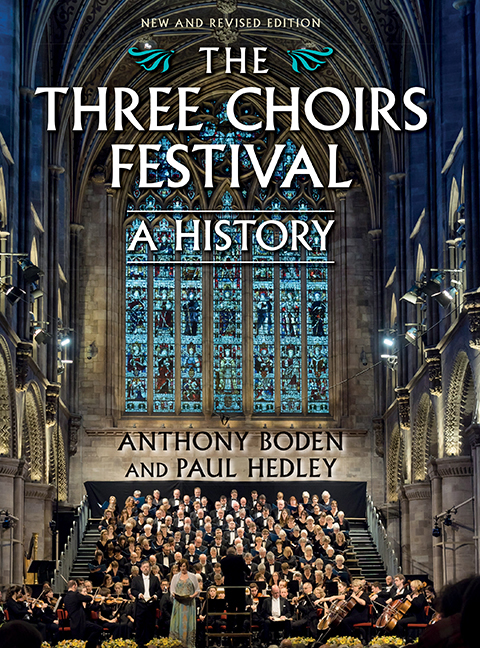Book contents
- Frontmatter
- Contents
- List of Illustrations
- Preface
- Acknowledgements
- List of Abbreviations
- List of Cathedral Organists
- 1 Origins
- 2 A Fortuitous and Friendly Proposal
- 3 A Numerous Appearance of Gentry
- 4 ‘The Musick of my Admiration Handel’
- 5 The Gentlemen and the Players
- 6 Avoiding Shipwreck
- 7 Prima voce
- 8 Favourites and Flops
- 9 Sacred and Profane
- 10 Froissart
- 11 The Unreasonable Man
- 12 The Dream
- 13 Beyond these Voices
- 14 An Essentially English Institution
- 15 The Elgar Festivals
- 16 Dona nobis pacem
- 17 Recovery
- 18 Association
- 19 A New Epoch
- 20 Jubilee
- 21 Theme with Variations
- 22 Houses of the Mind
- 23 ‘A Gold-Plated Orchestra’
- 24 A New Millennium
- 25 Reorganisation
- 26 An Invitation to the Palace
- Appendix Three Choirs Festival Timeline
- Select Bibliography
- Index
- Plate section
11 - The Unreasonable Man
Published online by Cambridge University Press: 11 August 2017
- Frontmatter
- Contents
- List of Illustrations
- Preface
- Acknowledgements
- List of Abbreviations
- List of Cathedral Organists
- 1 Origins
- 2 A Fortuitous and Friendly Proposal
- 3 A Numerous Appearance of Gentry
- 4 ‘The Musick of my Admiration Handel’
- 5 The Gentlemen and the Players
- 6 Avoiding Shipwreck
- 7 Prima voce
- 8 Favourites and Flops
- 9 Sacred and Profane
- 10 Froissart
- 11 The Unreasonable Man
- 12 The Dream
- 13 Beyond these Voices
- 14 An Essentially English Institution
- 15 The Elgar Festivals
- 16 Dona nobis pacem
- 17 Recovery
- 18 Association
- 19 A New Epoch
- 20 Jubilee
- 21 Theme with Variations
- 22 Houses of the Mind
- 23 ‘A Gold-Plated Orchestra’
- 24 A New Millennium
- 25 Reorganisation
- 26 An Invitation to the Palace
- Appendix Three Choirs Festival Timeline
- Select Bibliography
- Index
- Plate section
Summary
The reasonable man adapts himself to the world: the unreasonable one persists in trying to adapt the world to himself. Therefore all progress depends on the unreasonable man.
George Bernard Shaw (1903)AT the time of Langdon Colborne's death in 1889, Charles Lee Williams had been in post at Gloucester for seven years, and William Done at Worcester for forty-five. Both men were, in their different ways, much liked and respected: Done, quietly persuasive and undemonstrative; Williams, clear in his purpose and firm but diplomatic. The new man appointed to Hereford was of a very different personality.
George Robertson Sinclair (1863–1917) was born at 3 Devonshire Villas, Sydenham Road, Croydon, on 28 October 1863. His ancestors were of Scottish descent but had for several generations been settled in Ireland, at Killiney, near Dublin. His father, Dr Robert Sharpe Sinclair, held the appointment of Director of Public Education in Bombay, and it was owing to the temporary residence of his mother in England that Sinclair happened to be born in Croydon. But he was extremely proud to call himself an Irishman, proclaiming his nationality during the Hereford Festival week by hoisting the Irish flag outside his house.
At the age of eight Sinclair entered the Royal Irish Academy of Music, where he studied under Sir Robert Stewart, who was an old friend of his father's and of Sir Frederick Gore Ouseley. Thus, in 1873, young Sinclair – aged ten – gained a choral scholarship at St Michael's College, Tenbury, where he was the only boy known to have been taught personally by Ouseley. His parents intended that he should take Holy Orders; but the death of his father when Sinclair was seventeen threw him upon his own resources. When Bishop (afterwards Archbishop) Benson, of Truro, asked Ouseley to recommend him an organist for the proposed Cornish cathedral, he at once nominated Sinclair
- Type
- Chapter
- Information
- The Three Choirs Festival: A HistoryNew and Revised Edition, pp. 153 - 160Publisher: Boydell & BrewerPrint publication year: 2017



